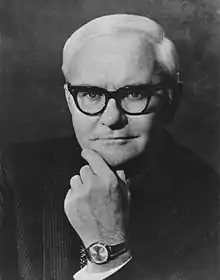Kenneth Rush
David Kenneth Rush (January 17, 1910 – December 11, 1994) was a United States Ambassador who helped negotiate the groundbreaking Four-Power Agreement in 1971 that ended the post-war crisis over Berlin.[1]
Kenneth Rush | |
|---|---|
 | |
| United States Ambassador to France | |
| In office November 21, 1974 – March 14, 1977 | |
| President | Gerald Ford Jimmy Carter |
| Preceded by | John N. Irwin II |
| Succeeded by | Arthur A. Hartman |
| Counselor to the President | |
| In office May 29, 1974 – September 19, 1974 | |
| President | Richard Nixon Gerald Ford |
| Preceded by | Anne Armstrong |
| Succeeded by | Robert T. Hartmann John Otho Marsh Jr. |
| United States Deputy Secretary of State | |
| In office February 2, 1973 – May 29, 1974 | |
| President | Richard Nixon |
| Preceded by | John N. Irwin II |
| Succeeded by | Robert S. Ingersoll |
| 14th United States Deputy Secretary of Defense | |
| In office February 23, 1972 – January 29, 1973 | |
| President | Richard Nixon |
| Preceded by | David Packard |
| Succeeded by | Bill Clements |
| United States Ambassador to West Germany | |
| In office July 22, 1969 – February 20, 1972 | |
| President | Richard Nixon |
| Preceded by | Henry Cabot Lodge Jr. |
| Succeeded by | Martin J. Hillenbrand |
| Personal details | |
| Born | January 17, 1910 Walla Walla, Washington, U.S. |
| Died | December 11, 1994 (aged 84) Delray Beach, Florida, U.S. |
| Political party | Republican |
| Spouse(s) | Jane Gilbert Smith
(m. 1947–1994) |
| Children | 6 |
| Education | University of Tennessee (BA) Yale University (LLB) |
Early life
Kenneth Rush was born David Kenneth Rush in Walla Walla, Washington, where his parents, from an old Tennessee family, had journeyed during a yearlong tour of the western United States. His father was a farmer in Greenville, Tennessee and his mother a teacher. His father died when he was two years old.[1] After attending secondary schools in Greenville, Rush worked his way through the University of Tennessee by waiting on tables. He majored in history and was elected into the Phi Beta Kappa. In 1932, he enrolled in Yale Law School, where he edited the law journal and earned an LL.B. degree.[2]
Career
Early career
From 1936-1937, Rush joined the Duke University faculty as an assistant professor and taught law. It was here that he met to-be-President Richard Nixon who was a student at the university. It was the beginning of their enduring friendship. In 1937, Rush accepted an offer to join the Union Carbide and Carbon Corporation with the prospect of an executive position. He became a vice president in 1939 and was named president in 1966.[1]
Political career
Rush resigned from all private positions in 1969 to become United States Ambassador to West Germany. Rush was credited for playing a major role in the successful conclusion of the Four Power Agreement on Berlin between the United States, Britain, Soviet Union, and France after 17 months of negotiations. The agreement ended more than two decades of East-West tensions over the divided former capital of Germany; it improved ties between Washington and Moscow, reaffirmed the Western Allies' rights in the city and paved the way for the development of peaceful relations between East and West Germany.
President Richard Nixon appointed Rush as Deputy Secretary of Defense for 1972 under Melvin Laird,[1] then named him Deputy Secretary of State from February 1973 to May 1974, including a period from September 3 to September 22 when Rush served as interim Secretary of State between the terms of William P. Rogers and Henry Kissinger.[3] On May 25, 1974, he was appointed counselor to the president for economic policy.[4] From 1974 to his retirement on March 15, 1977, he served as Ambassador to France.[5]
Death
Rush died at his home in Delray Beach, Florida on December 11, 1994 at the age of 84. According to one of his sons, he was under treatment for heart and blood ailments.
Personal life
In 1947, Rush married Jane Gilbert Smith. They had five sons and one daughter. Two of their sons died at a young age.
References
- Binder, David (December 13, 1994). "Kenneth Rush, U.S. Diplomat, Is Dead at 84". The New York Times. Archived from the original on 2019-06-07. Retrieved 2009-08-22.
- "Kenneth Rush". Retrieved 2009-08-22.
- "KENNETH RUSH (1910–1994)". Office of the Historian, Bureau of Public Affairs, United States Department of State. Retrieved 3 January 2016.
- Matusow, Allen J. (1998). Nixon's Economy: Booms, Busts, Dollars, & Votes. Lawrence, Kan.: University Press of Kansas. p. 281. ISBN 0-7006-0888-5. OCLC 37975682.
- Dunhan, Elizabeth (July 20, 2006). "Kenneth Rush Papers". Archived from the original on June 25, 2010. Retrieved 2009-08-22.
External links
| Wikisource has original works written by or about: Kenneth Rush |
| Diplomatic posts | ||
|---|---|---|
| Preceded by Henry Cabot Lodge Jr. |
United States Ambassador to West Germany 1969–1972 |
Succeeded by Martin J. Hillenbrand |
| Preceded by John N. Irwin |
United States Ambassador to France 1974–1977 |
Succeeded by Arthur A. Hartman |
| Political offices | ||
| Preceded by David Packard |
United States Deputy Secretary of Defense 1972–1973 |
Succeeded by Bill Clements |
| Preceded by John N. Irwin |
United States Deputy Secretary of State 1973–1974 |
Succeeded by Robert S. Ingersoll |
| Preceded by Anne Armstrong |
Counselor to the President 1974 Served alongside: Anne Armstrong, Dean Burch |
Succeeded by Robert T. Hartmann |
| Succeeded by John O. Marsh | ||



.jpg.webp)